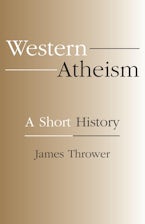
Western Atheism
A Short History
Published by: Globe Pequot
178 Pages, 6.00 x 9.00 x 0.50 in
- eBook
- 9781615923502
- Published: September 2009
Other Retailers:

Published by: Globe Pequot
178 Pages, 6.00 x 9.00 x 0.50 in
Other Retailers: